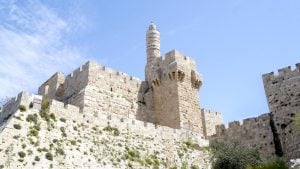
Yeshaya 27:6–28:13, 29:22–23
Our Worthiness to Greet Mashiach
We often hear Jewish people questioning their worthiness to merit the advent
of Mashiach. Our nation’s rapid spiritual decline makes them wonder if they will
ever be worthy of living in the pure spiritual setting of Mashiach. Yeshaya’s
message in this week’s Haftarah addresses this subject and helps us answer
some of their concern.
From Servitude to Nobility
Yeshaya opened the Haftarah with an encouraging message and said, “Those who
are coming will strike roots as Yaakov; they will blossom and flower as Yisrael.” Rashi
explains these words to refer to the Jewish nation’s early stay in Egypt and to their
miraculous development in their foreign environment. Yeshaya said that they entered
Egypt as Yaakov, but that they developed there into Yisrael. Rabbeinu Bachya notes that
categorically the Torah switches between Yaakov’s name from birth and the name
Hashem conveyed upon him, Yisrael. He explains that, in general, the Torah refers to the
Jewish people as Yaakov when they are in a lowly state, akin to Yaakov’s early years,
whereas the name Yisrael is used when they are in an elevated, noble state, similar to
our patriarch Yaakov. Accordingly, he explains that the Jewish people’s name Yaakov
reflects their downtrodden status during their dark years of exile and their name Yisrael
reflects their spiritual supremacy. (Rabbeinu Bachya on Bereishis 45:28) Yeshaya
therefore recalled the Jewish people’s experience in Egypt in this context and stated that
they settled into Egypt as a downtrodden forlorn family, but that they were liberated as a
towering spiritual beacon to the world.
Chazal reveal that Yaakov’s family began feeling its pending servitude at the time of
his passing from the world, within twenty years of their arrival to Egypt. (Rashi on
Bereishis 47:28) Although they were not enslaved for close to another hundred years,
nevertheless, after Yaakov’s passing they were lowered from their elevated status. Once
they forfeited their prominence and nobility as the illustrious family of the premier chief
advisor of Egypt, Yaakov’s household continued to lose its superior identity and
eventually became the personal possession of the Egyptians.
Buried Identity
In truth, the Jewish people’s identity was not lost, rather it was buried under layers of
foreign influence. Their true prominence was being preserved for their era of redemption
and spiritual elevation. And, when the appropriate moment arrived, Hashem liberated
His people and elevated them to their befitting status. He restored their honor and
nobility and established them as the focal point of the world. Yeshaya typified that drastic
transition through their national name-change from Yaakov to Yisrael. Yaakov’s family,
after the passing of their role model, settled into Egypt as a forlorn family struggling to
retain its identity, but it emerged from its trying experience as a prominent, noble people
who won the favor and respect of all.
In truth, their development resembled that of their ancestor, Yaakov, who miraculously
survived the murderous hands of Eisav and Lavan and even overcame Eisav’s powerful
angel. That spiritual victory earned Yaakov his supreme status of Yisrael, a name that
reflects supremacy (Rashi on Bereishis 35:10) as the Torah states, “[Your name shall be]
Yisrael for you have attained supremacy over angels and people.” (Bereishis 32:29)
Yeshaya reminded the Jewish people through the mention of their name-change that
although their identity appeared to be lost in Egypt, in truth, it was actually buried under
layers of Egyptian bondage. Therefore, when the appropriate moment arrived, the
Jewish people regained their identity and earned higher prominence than ever before.
Potential Spiritual Supremacy
Yeshaya’s words, in addition to typifying the Jewish people’s sociological
development, also depict their spiritual development. In this week’s Parsha the Torah
alludes to the Jewish people’s moral and ethical conduct in Egypt. The Torah describes
their unprecedented population explosion in the following words, “And the children of
Israel were fruitful and multiplied in swarms, proliferated and became overpowering in
excessive measures.” (Shemos 1:7) Seforno notes that the Torah’s peculiar description
of “multiplying in swarms” compares the Jewish people to crawling creatures. He
explains that indeed the Torah hinted to that phenomenon and depicted with it the
Jewish people’s severe moral and ethical decline once they fell prey to abhorrent
Egyptian culture. (Seforno on Shemos 1:7) Seforno’s interpretation concurs with
Chazal’s similar statement that the Jewish people instead of remaining spiritually
insulated in Goshen, readily participated in the Egyptians’ immoral forms of amusement
and entertainment. (Yalkut Shimoni ibid.)
But that description did not portray the Jewish people’s true spiritual identity. Hashem
proclaimed to Pharaoh from the outset their true identity and declared, “My beloved first
born, Yisrael.” (Shemos 4:22) Although the Jewish people’s conduct in Egypt certainly
did not reflect greatness, their conduct was a result of enticing Egyptian influence and
coercion. Hashem’s message to Pharaoh was that when Hashem will reveal Himself to
His people, they will show their true face. They will show incredible loyalty to Hashem as
His dear son and will respond favorably to His invitation to become His elevated people.
Indeed, the Jewish people responded as predicted and displayed perfect faith in
Hashem with a resolve to blindly follow Him wherever He would lead them. (Rashi on
Shir Hashirim 1:4)
Seforno notes that Yaakov’s family began its drastic spiritual decline after the passing
of its original seventy members who were transplanted to Egypt from Eretz Yisrael. Once
their glaring role models were far out of sight, the Jewish people rapidly acclimated
themselves to the foreign ways of Egypt and adopted its alien culture. (Seforno on
Shemos 1:6) However, that severe spiritual decline did not affect the core essence of the
Jewish people; they remained, beneath the surface, enriched with lofty spiritual values.
Therefore, after years of tormenting servitude and torturous slavery, the Jewish nation
miraculously emerged with sanctity and dignity. They regained their supreme identity
and nobility and spiritually recharged themselves with an intense program of forty-nine
days of devotion and introspect. That incredible comeback helped them merit Hashem’s
unprecedented revelation to them at Har Sinai accompanied by their temporal elevation
to semi-spiritual beings. (based on Rashi to Shabbos 88b) Yeshaya focused here on the
Jewish People’s experience in Egypt to display their true potential. Although they
digressed in Egypt to the level of swarming creatures, their true potential remained to be
that of spiritual angels.
Unprecedented Spiritual Comeback
Yeshaya continued and prophesized that the Jewish people’s history would repeat itself.
He warned the Judean kingdom not to follow the repulsive practices of the Samarian
kingdom that was subject to soon be exiled. He predicted “The fortified city
[Yerushalayim] will be forlorn and its abode [the Bais Hamikdash area] will be open to all
and forsaken like a wilderness…because they are a people who do not contemplate
[consequence], therefore their Creator will have no compassion for them and will show
them no grace.” (based on Radak to 27:10-11) He continued and sharply reprimanded
the ten Samarian tribes for their abhorrent practices and demanded of them to remove
every trace of idolatry from their kingdom. He sharply rebuked them for their repulsive
behavior and said, “Woe unto you, crown of arrogance; drunkards of Efraim. The
splendor of your glory will be likened to a withering bud.” (28:1) He forewarned them of
their imminent exile and of the downfall of their entire Samarian kingdom. He followed
and addressed the Judean kingdom and blamed it for following its brother’s path. He
said, “And they [the Judean kingdom] were also negligent through wine and they strayed
through intoxication…because all of their tables were replete with refuse without any
remaining space.” (28:7-8) Yeshaya’s words referred to the Judean kingdom’s terrible
plunge into idolatry. Although those repulsive practices began in the Samarian kingdom,
they eventually made their way into the Judean kingdom and influenced them to
severely stray from the Torah path.
However, amidst this, Yeshaya shifted his tone and shared warm comforting words
with the Judean kingdom and exclaimed, “On that day Hashem will be a crown of
splendor and a diadem of glory for the remnant of His people.” (28:5) Radak interprets
these words to refer to the miraculous era of King Chizkiyahu. Yeshaya prophesized that
after the mighty Assyrian King Sancherev would conquer the world and the Judean
mountains, he would set his sights on Yerushalayim. Yeshaya told the Judean kingdom
that although Sancherev would bring millions of soldiers to charge into Yerushalayim,
Hashem would perform an incredible miracle and would spare His people from any
casualty. That miracle would transpire in response to Chizkiyahu’s unprecedented
campaign to proliferate Torah knowledge throughout his kingdom. Chazal record that
during Chizkiyahu’s illustrious era everyone in the land, men, women and children, were
proficient even in the complex laws of ritual cleanliness. (Sanhedrin 94b) Yeshaya
informed the Judean kingdom that although it had been heavily involved in idolatry
merely one generation earlier, it would thoroughly cleanse itself from sin and it would
totally immerse itself in Torah diligence and ritual cleanliness. That unparalleled devotion
to Torah study and knowledge would give rise to one of Hashem’s greatest revelations of
all times.
Yeshaya introduced that upcoming experience through the Jewish people’s
experience in Egypt. Their complete turnabout from an undisciplined race to a dignified,
spiritual people displayed their true potential. Although they severely strayed from the
ethical and moral code of their ancestors, they made a total reversal from spiritual
bankruptcy to unprecedented perfection. Yeshaya exclaimed to the Jewish people of his
time that they were capable of doing the same. Although the Judean kingdom severely
strayed from the perfect ways of its ancestors, Yeshaya prophesized that it would make
a total reversal and would achieve unforeseeable, national levels of accomplishment.
From Shame to Glory
In that spirit, Yeshaya directed his words to our patriarch Yaakov. Yeshaya said in
Hashem’s name, “Now, Yaakov will not be embarrassed, and his face will not turn white
[in shame] because when his children see My hand in their midst, they will sanctify My
name…and exalt the Hashem of Israel.” (29:22-23) Yeshaya’s words suggested that the
Jewish people’s conduct could actually become so inexcusable that their beloved
patriarch Yaakov would be embarrassed and ashamed of them. Hashem said about
Yaakov that if that were to become a reality, he would focus on his children’s unlimited
potential. Hashem said with this, that although the Jewish people tend to follow their
alien surroundings and stray from the proper path, but, as history repeatedly shows,
whenever He shines His light upon His people they regain their stature and greatness.
Hashem, therefore, said that Yaakov will overlook his children’s spiritual bankruptcy and
will focus on their true potential. The time will eventually come for Hashem to liberate His
precious first-born from its long, painful, and dark exile. And, when Hashem will shine
His light on His people, they will, undoubtedly, respond and reveal their true potential.
They will immediately rise from their forlorn, downtrodden status of Yaakov to the lofty
supreme status of Yisrael and will praise and glorify Hashem’s name for eternity.
This message is so important for us in our present state. Although it is difficult to
fathom how our generation could conceivably merit Hashem’s ultimate redemption, let
us follow Hashem’s advice to Yaakov. Let us remember that our nation’s spiritual
essence has never been affected. Beneath the many layers of alien influence lies a
sparkling jewel waiting to be exposed. And, when Hashem will fully reveal Himself, we
will, undoubtedly, respond with total devotion and commitment and will merit glorifying
Hashem’s name for eternity.


